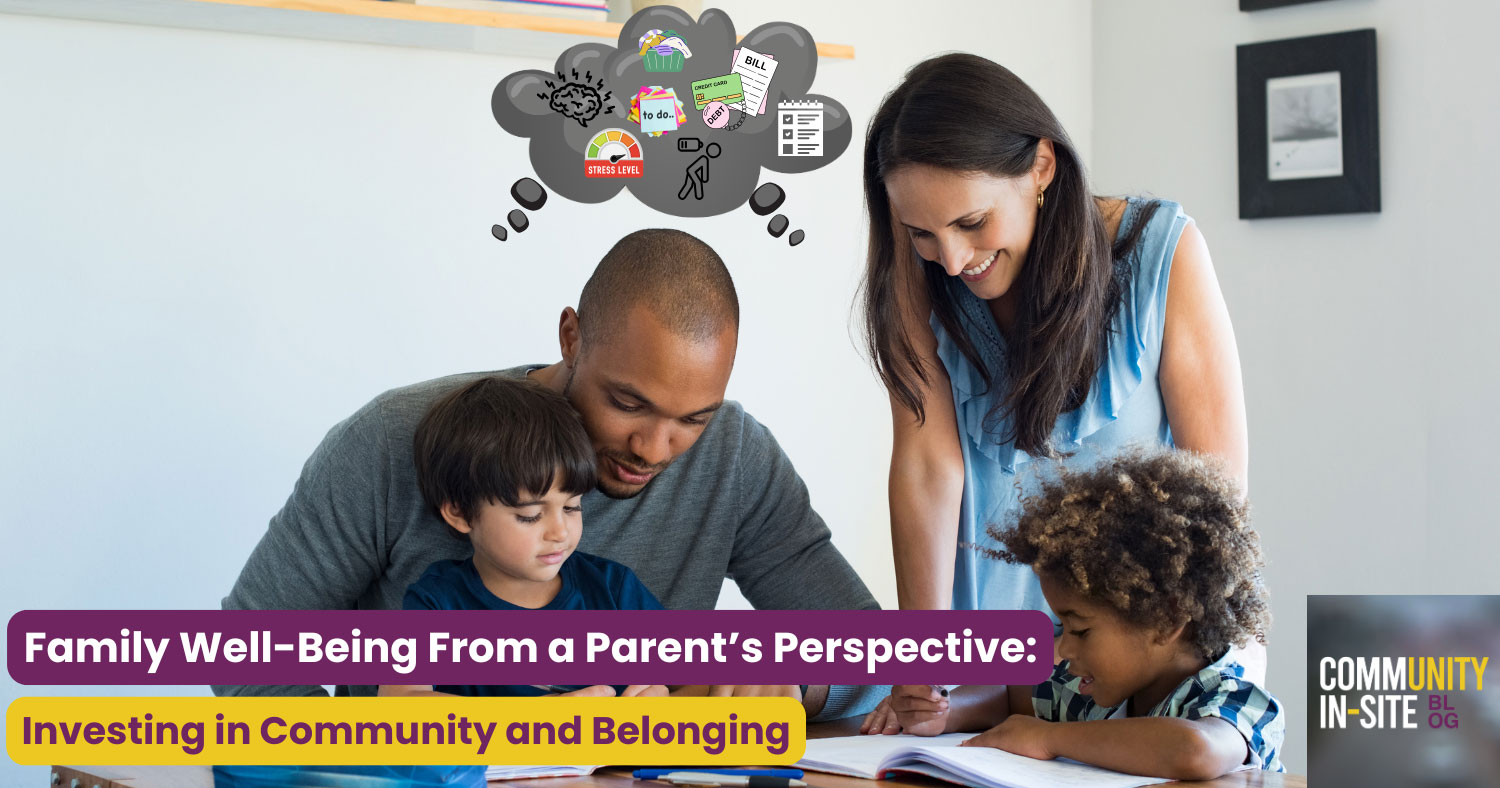
Family Well-Being from a Parent’s Perspective: Investing in Community and Belonging
By: Valerie Frost
Parenting can be incredibly rewarding, but it’s also tough.
We need to invest in parents so they have access to the essential support services they need. We also need to invest in community-based solutions that reduce stress and empower parents to connect more deeply with their children.
By the time the workday starts, I’ve already made beds, brushed teeth, styled hair, cooked breakfast, packed lunches, picked out clothes, waited at the bus stop, and driven to daycare. If I’m lucky, I’ve managed to shower and pack my own lunch. And this is just on a good day—when no one is arguing, nothing gets spilled, no permission slips or folders are missing, and nothing is forgotten during drop-offs, so I don’t have to make a second trip home.
According to the U.S. Surgeon General’s Advisory on the Mental Health & Well-Being of Parents (2024), nearly 60% of parents feel overwhelmed by the demands of parenting and work. This stress can lead to physical health problems, burnout, and a lack of energy to engage with kids in meaningful ways.
When parents aren’t supported, the costs extend beyond just feeling tired. At best, the household has a bad day; at worst, stress undermines coping and resilience, making it harder to be the parent they want to be. This increases the likelihood of losing patience or making harmful decisions under pressure.
A relatable example is parenting when you need a Snickers versus being full and satisfied. Parents can’t be at their best if they are constantly running on empty. Chronic stress clouds judgment, making it harder to parent with patience and care. You’re not parenting at your best when you’re burdened.
In 2024, nearly 1 in 5 children in the U.S. lived in households lacking resources to meet basic needs like food and healthcare (U.S. Department of Agriculture). These statistics highlight systemic inequities that need addressing. Instead of expecting parents to do it all alone under such heavy financial and emotional strain, what if we asked how we, collectively, could help?
Creating a connected, supportive community doesn’t require huge changes. Sometimes small, meaningful shifts can make a big difference. Here are a few examples:
- Offer to watch kids for an hour to give parents a break or help with tasks: We talk about self-care, but it’s hard to find time when you’re constantly needed. On a parent’s worst day, whether sick, sad, or overwhelmed, kids are still there, endlessly asking for snacks and entertainment. A small gesture like offering to watch the kids for an hour can provide a much-needed pause, allowing parents to recharge and return to their children with more energy and patience.
- Help with school pick-up or drop-off to reduce rush time and allow connection with kids.Getting out of the house with children is never easy. When kids are feeling safe and attached to their caregivers, they’re often most adventurous and least likely to listen. Packing up, buckling up, and racing against the clock to get to and from school or daycare creates ample opportunities for meltdowns and misunderstandings. The commute can also eat into precious time with kids, especially if a parent is juggling work and rush hour traffic. Offering help with school pick-up or drop-off alleviates that chaos. It saves time and gives parents a chance to connect with their kids without the usual pressure, making post-school time more relaxed and enjoyable.
- Assist with chores like folding laundry or washing dishes, giving parents more time for their children: Constant noise from playful giggles and discoveries makes for a happy home, but it can also be overstimulating, especially with a to-do list running in the back of a parent’s mind. Joining in on dance parties and fort building is a joyful part of parenting, but it also requires mental space and competes with finding time to tackle household chores. It’s a constant juggle deciding between engaging with kids and managing tasks when you can’t be in two places at once. Offering help with these chores allows parents to focus on what truly matters: spending quality time with their children, free from the pressure of undone tasks.
When we support parents, we support families, and when families thrive, our communities grow stronger. The cost of not investing in parents is high, not just for the parents themselves, but for everyone.
As we move forward, I look to the growing family well-being movement for hope. Season One of the Community In-Site podcast has shown me that change is possible, and I hope listeners feel the same. In particular, Sarah’s episode illuminated how a lack of economic support is often a driver of family separation, not bad parenting. Clare’s conversation about policy solutions provides a roadmap for addressing the root causes of family stress and creating an environment where all families can thrive.
Parenting is hard. Community helps. When we invest in parents, we invest in our future. And when parents thrive, we all thrive.
Other episodes from Season 1 you may want to refer back to:
- Zenayda’s episode on how investing in parents as business owners can lead to financial stability.
- Kailene’s discussion on the power of cultural ties in strengthening families.
This blog is part of a series connected to the Community In-Site podcast, where we dive deeper into the stories and lessons from the growing family well-being movement. To hear more about how you can support families and strengthen communities, check out the podcast at thrivingfamiliessaferchildren.org.
This project was funded by the Annie E. Casey Foundation. We thank them for their support, and acknowledge that the opinions and conclusions presented in the blogs are those of its authors alone, and do not necessarily reflect the opinions of the Foundation.







